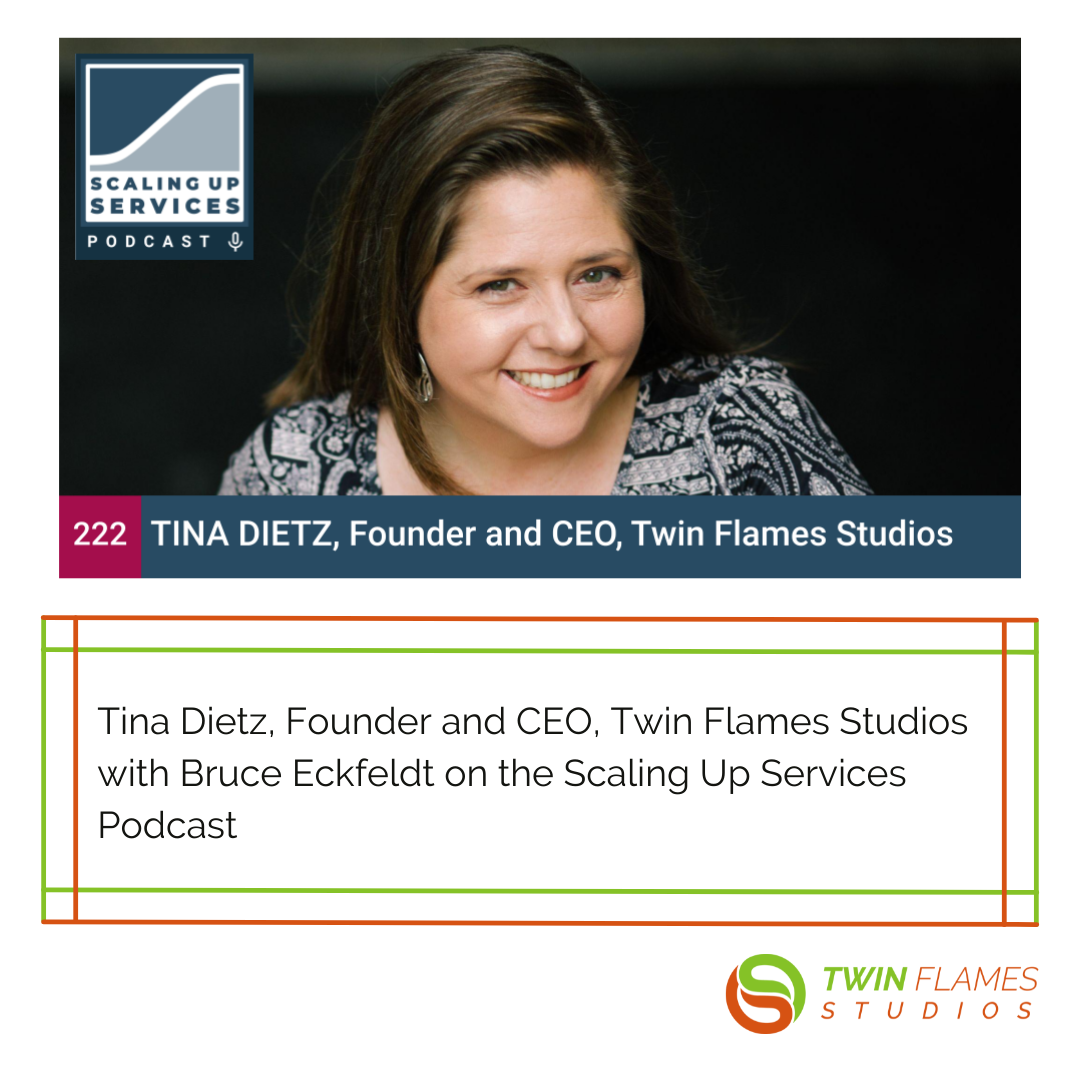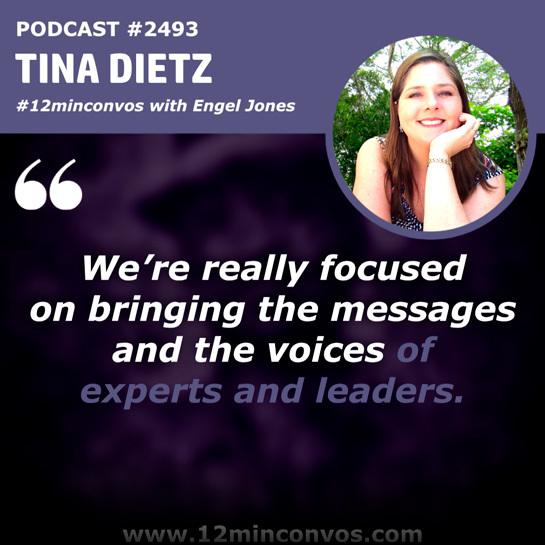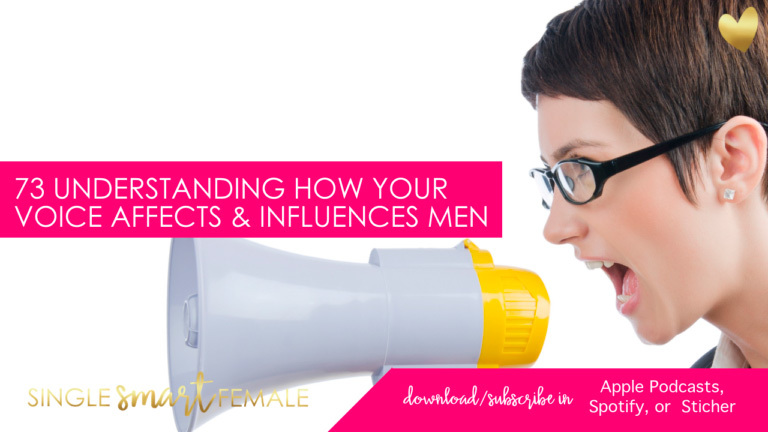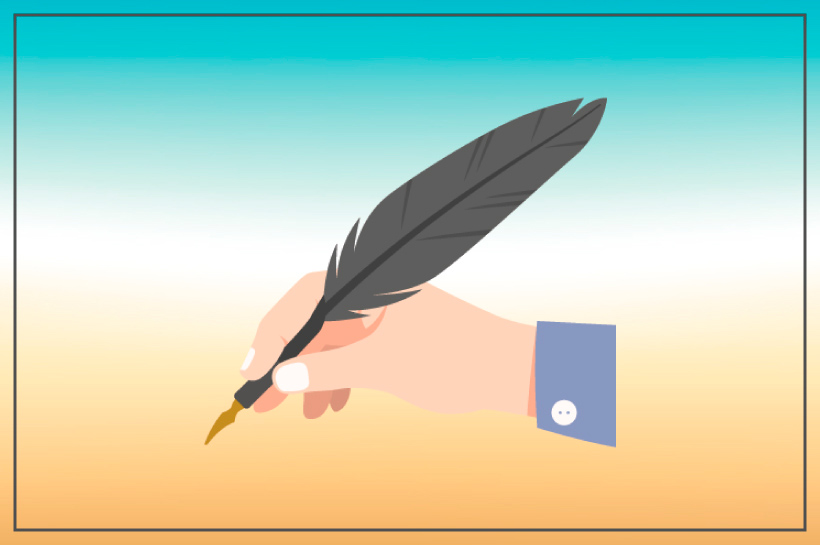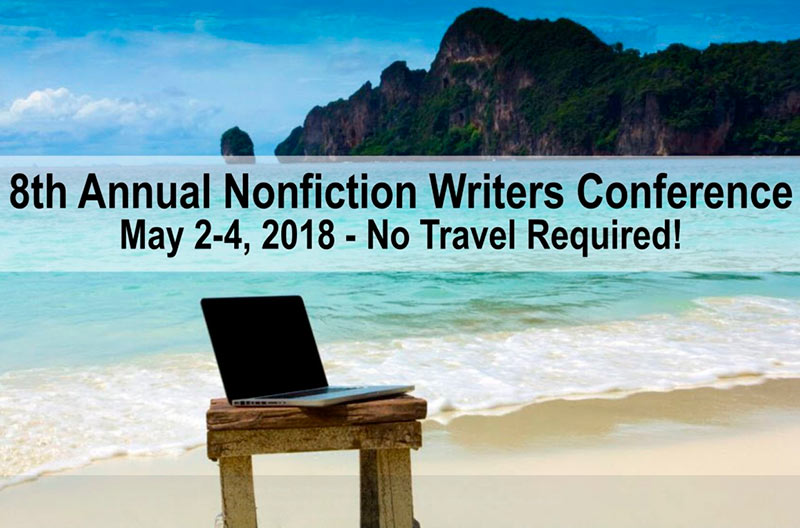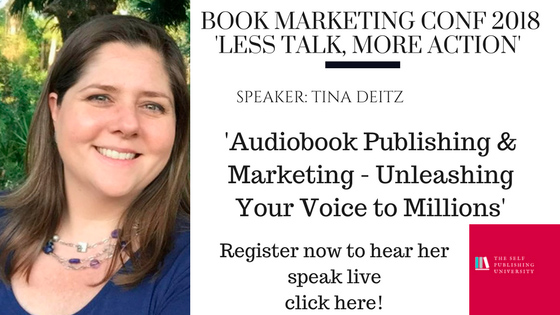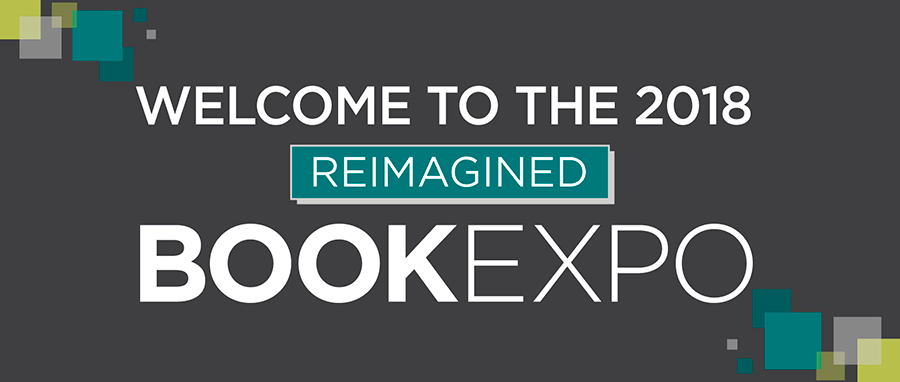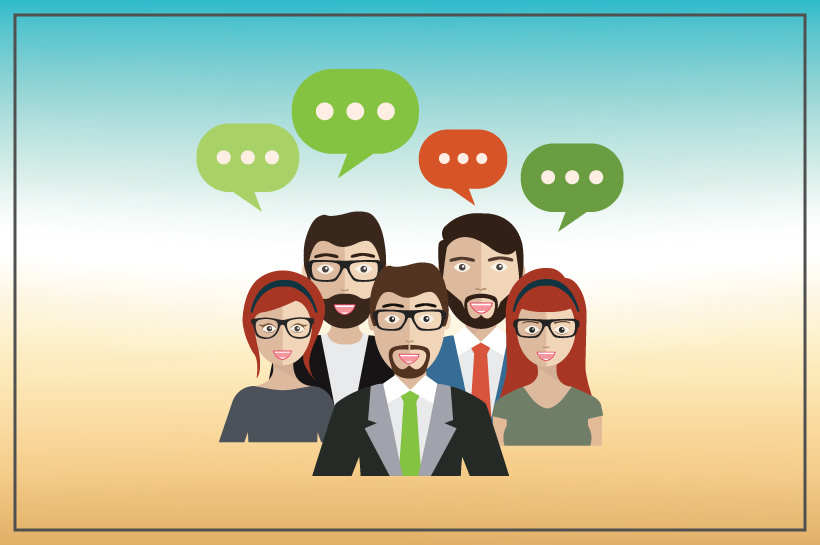How Podcasting Maximizes a Culture of Excellence and Innovation in Organizations with Tina Dietz and Jose Pires
Did you know one of the most powerful ways you can connect with your clients is through podcasting? You can learn more about the benefits of podcasting, what questions you need to answer before you begin your podcast, and how Twin Flames Studios helps get your voice into more ears on my guest interview with Bruce Eckfeldt on the Scaling Up Services podcast.(Scaling Up Services Podcast with Bruce Eckfeldt, October 2021)
Tina spoke with Bruce Eckfeldt on the Scaling Up Services podcast to discuss how podcasts hone your brand, provide evergreen marketing content, and create deeper relationships.
In this episode, you'll learn:
- Why audio is one of the most intimate mediums for storytelling
- The top questions to ask before you start your podcast
- How podcasts can revitalize your marketing and expand your reach
- And more!
Listen to their conversation here!
Bruce Eckfeldt Are you a CEO looking to scale your company faster and easier? Check out Thrive Roundtable. Thrive combines a moderated peer group mastermind expert one on one coaching access to proven growth tools and a 24/7 support community. Created by Inc. award-winning CEO and certified Scaling Up Business coach, Bruce Eckfeldt, Thrive will help you grow your business more quickly and with less drama. For details on the program, visit eckfeldt.com/thrive.
Welcome, everyone. This is Scaling Up Services. I'm Bruce Eckfeldt. I'm your host. Our guest today is Tina Dietz. She is the founder at Twin Flames Studios. We're going to talk to her about the work that she does with companies helping them with creating content, with promotion. This is a really kind of interesting topic. I think so many service companies based their marketing, based their sales and lead development, based on thought leadership and getting content out in the world. And there's so many different types of content and so many different ways you can do it. I really think they–obviously I love podcasting–but you know, podcasts, audiobooks, you know, spoken word kind of content, there's so many things you can do with it. There's so many things you can use to generate awareness, generate thought leadership, generate leads. I'm excited for this and excited to hear Tina’s story and how she got into this this world of audio content production and what she's been doing with service companies. So, with that, Tina, welcome to the program.
Tina DietzHey, Bruce, thanks for having me.
It's a pleasure having you on. So before we dive into what you're doing with Twin Flames right now and stuff, why don't we talk a little bit about you and get a sense of your background? Give us the story. What was your professional journey? And how did you get into what you're doing today?
Well, like most entrepreneurs, it's fairly stupid. It's just like, “Well, how the hell did this happen?” Yeah, yeah. And that's, and that's what we hear more than everything. If you had asked me, you know, when I was growing up, if, you know, in 25 years or whatever, you're going to own a company that produces audio content in the land of thought leadership for service-based companies. I'm sorry, what? What, what? It didn't even exist, right? You know, at the time?
So my upbringing was I had a younger sibling–that was a business. My parents owned a business that they started when I was three years old. It was my younger sibling, and I hated it. It was a wood burning stove and fireplace business. So real sexy, awesome. And basically, that was my constant companion growing up. So I was steeped like a tea bag in entrepreneurship. From a very young age, I started answering phones when I was four and going to trade shows when I was six, I do a whole talk will have to do another time maybe on how I found my purpose in life through the Ginsu knife demonstration at a local fair. So that’s a whole thing, that's the whole thing. And, you know, I never really thought I'd own a business, but I became a therapist–for a number of reasons. Childhood was not a great place. But you know, lessons learned. It's one of those things. And I've spent a lot of time in the world of personal development, in leadership and all of that. So cultivating myself, of course, created in me a desire to see what else could be done for other people.
That led me to coaching and consulting, which then ended up leading me to podcasting and ultimately to audio production. Basically, through a paid hobby I had as a voice actor. You know, I'm an entrepreneur, we can't have regular hobbies, we have to have hobbies that pay us. That's the way it works. We can't have normal hobbies. So I was a voice actor on the side and taking some classes and masterclasses in audiobook narration. And I had this chocolate and peanut butter moment, this light bulb, aha, that, “Oh, my God, why aren't all my clients and colleagues who are doing best selling campaigns and producing books, why aren't they doing audiobooks?” And that was, as Michael Gerber from The E Myth says, you know, my “entrepreneurial seizure” that led me to investigate the world of audio and led me to a big gap in the market and dove into that.
I took over my business within a year of starting to offer services in this big market gap of done-for-you audiobooks, and also the corporate side of podcasting. And that is kind of was the best decision that I ever made. And so I went from basically being a solopreneur, consultant who'd worked with more than 20 industries in eight countries to being the CEO of a company that now produces content in the land of audio that changes lives and hearts and minds for service-based companies and making sure that they're having this beautiful, human, authentic voice of their company that comes through this medium of audio.
Yeah, I'm curious. You've had a couple of different kind of pivots in your commercial world and career what are some of the things that you had to learn or had to kind of change about your thinking, your leadership, your approach during those pivots?
Bruce, I thought you said this was only a half hour podcast.
The top two. Just the top two.
The top two. One: choose who gets in your ear very carefully, very carefully. I'm very much of a happy puppy kind of person. I'm just like, “Yeah, let's do it. Let's change the world. Let's make it happen.” I have a lot of enthusiasm and energy and kind of that visionary habit–you see something and you want to make it happen. And it took me a long time to really learn how to vet the people that I was working with, or who I was throwing in with, because I assumed for a long time, in a very naive way, that everyone had the same values that I did around integrity and communication, and, you know, working together and making sure everybody wins. And it doesn't always work that day. Most people, most people, 99% of people on the planet are doing their best. But you know, problems and challenges that come up, don't always bring out the best in people. Sometimes it brings out the worst in people. And so learning how to create relationships over time and cultivate those relationships carefully has been a huge game changer in my world to keep things consistent and growing in the right direction.
And the other piece of the puzzle has been, you know, doing my own inner work. I'd say all the time that we were born with two voices: the voice you speak with and the voice that speaks to you. And working on the voice that speaks to me has made the biggest difference in anything that I've done as a leader, as a business owner, as a partner, a wife, a mom, you know, on any of that, to cultivate that inner world–and I could do many, many, many hours, and all the things that have happened there. But suffice to say it's been a journey.
That's a really great, that's a great realization. And yeah, I think it's, you know, time is your most precious commodity and where you spend it, you know, how you spend it, who you spend it with, are all kinds of things that are really going to influence your success and what you end up doing. Tell me a little bit about kind of why audio content? I mean, what's your kind of take on the world? You know, that we're in today? Why is audio content so powerful, so important? Why have you chosen to focus on it?
Well, going back to what I said a moment ago about our internet, our voices, it's something every human being on the planet is born with. And it's something that cannot be taken away. And speaking, as someone who has felt in the past that my voice was taken away and was suppressed, having that voice and having a place at the table to have that voice heard, is incredibly valuable. And so, everything that I have done, and what we do as a company with Twin Flames, is designed to give people a place at the table so that their voices are heard. And then it creates this incredible ripple effect that you know, podcasts and audiobooks are some of the lowest hanging fruit on the planet for people to start changing their lives.
If we can be a part of more leadership voices and more positive voices and more great information, reaching people all over the world, so that they can start to change their lives. That is a really powerful place to be. It is really about making the world a better place one kind of drip of audio at a time. And audio is very, very, very intimate compared to most other forms of media. It's single focus. Most people listen to audio right into their ear. So there is a neurological connection that's very powerful between, you know, the earbud I have in my ear, and the center of my brain, the amygdala, the hippocampus, all of those things. It's not just higher brain functions being impacted by the voice. And so there's an intimacy created in an impact that's really important. And storytelling, of course, is incredibly powerful worldwide. It's something that connects all of humanity. So when we bring all these factors together, neurological, you know, storytelling, how we're wired, the universal power of the human voice to create relationship–it's a very, very powerful medium. And it can be used in so many different ways and sliced and diced, and at the pace we're living at, you know, audio is the most portable form of media. You can listen when you can't read you can listen when you can't watch. So you know, it's never gone away. It's never going to go away. And all of those things together make it what I consider the perfect storm for perfect content.
Yeah, I was like that idea that audio content literally gets you in your prospect’s head.
Mm-hmm. Yeah, you got it.
So what are all the kinds of formats these days? I mean, we kind of went from you know, I date myself accidentally when I say I'm listening to a book on tape or something.
I know, right? Me too.
It's morphed so many times, like what is your kind of how do you kind of lay out the scope or the types of audio content that that you have at your disposal these days?
Well, we usually start with a primary form of content, which is generally a podcast. Podcasting, of course, is something that is hot right now. I’m on one as we speak, and it provides a nice bulk of content to start with, and a framework to start with. So unlike a video, the average video watcher will watch two minutes, but the average podcast listener will listen for 40 minutes.
And it's actually much harder to create short form content than it is slightly longer form content. We have thoughts, you know, curating what we say, you know, the brevity or like cutting things down to its core is much more challenging than this kind of a conversational format. And so, it allows people to be very natural, and very expansive in what they're talking about to dig into nitty gritty and to know that the listener is still going to be interested more than two minutes in, so you're not trying to pack things in. So we start with a longer form 20-30 minute podcast, usually sometimes longer, sometimes shorter, but that's on average what it is. And that gives us a lovely bulk of content to work with.
From there, there's all different ways to slice and dice that type of content, repurpose it, reuse it. And the authenticity that comes through when you're using audio and using this type of format is really important to reach people on a deeper basis, rather than just an informational basis.
Yeah. And when you look at companies, what are I guess, what are some of the companies or situations that are best served with audio content? Like who can really benefit from this form of content?
Well, we love working with relationship-focused, service-based companies. People who, when they're working with their clients, they have long-term relationships with their clients. For example, companies, which seem very dry, but there's a lot of content available in the financial world, in insurance, for example, education of varying kinds, and even things like retail, retail conglomerates, and things like that, that are creating more experiences. Travel can be served in this way, as well, although it does, definitely does need to be paired with the visual aspect as well. But it can be really, really, really beautiful. You will see a lot of influencer podcasting, that's generally not our super cup of tea.
We do a lot of work in the leadership space, though, helping to humanize brands that are large, and give the brand an avatar because we don't really do business with faceless, nameless corporations. We want to do business with people. So being able to communicate brand values and culture and leadership and innovation through the avatar of a podcast host is extremely powerful. Another industry that benefits a lot from podcasting is healthcare. And all of these have constraints with compliance and communication and legal and all of that. But we're able to navigate all of those waters, as well.
Yeah, yeah. So what are some of the other challenges? If you are interested in developing audio content? Like what do you need to kind of consider or think about setup?
The lift is largely at the beginning when you're–well with any type of content, right, so you have to decide that has enough value that you're going to spend the brain capacity and the bandwidth and the time to work with a company like ours, so that we can help you shape that voice and shape the type of content that's really going to benefit you. So choosing that it's going to be a priority.
And then having deep, intimate communication and regular awesome content are things that you really want to do, you also need to decide in terms of you know–and we work with our companies on this–like who's going to be hosting, who's your avatar, who's your people or person that you're going to be featuring. And there's a lot of creative ways to work with that scenario, as well. Everything from solo hosts to two hosts to a panel discussion and everything in between. There's, there's a lot of different ways to manage those kinds of questions, particularly if there's multiple people inside of a company who want to be at the forefront being that avatar for the company, that's all completely manageable.
Another thing the company really needs to decide is if their marketing department, and their team, how we're going to dovetail this with their other strategic initiatives. Podcasting should be one piece and audio should be a piece of a larger strategic picture for a company. It should never be a band-aid or just an outlier. It needs to be integrated because it is something that has high strategic value, and can augment or replace creating content in other areas like blog posts, social media post images, articles for industry publications, and even events and getting used in events in different ways. So, there's a lot of applications and being willing to dive into the strategy is super important.
And what goes into that strategy? What questions are you asking or what do companies need to think about, you know, in terms of understanding kind of the bigger picture strategy before they really get into, you know, executing a particular kind of audio content strategy?
Yeah, we like to get into working with their marketing team. and finding out what are their core values that they're looking to communicate. What is that mission? What is their vision for their company, and then building out kind of an avatar of their host, not of their audience, but of their host. You know, if you had to personify your company, who is kind of that person and that spokesperson to do that? That's certainly an area that we start with, we also need to look at, as I mentioned, their current strategic initiatives. What's already working for them in terms of their marketing? How can podcasting build upon that and make it even more robust? And what are their pain points that we can address that are challenging?
So one of the pain points we run into a lot with companies is just the generation of content to begin with, particularly from a very busy team. A larger company, you know, when you ask somebody to go and say, “Hey, would you write a blog post on this?” somebody who's a technician or a salesperson or whatever, they may not be a writer to do that. Using interview techniques, we can extract and pull really wonderful, real conversational information from team members that can be pulled into podcasting content, or then even turned into articles or ebooks or, you know, other types of content, as well. And the creation process becomes 100 times easier. And this is, of course, scalable for any size company to do that, whether we're working with a sales team, or we're working with, you know, a CPA firm.
Yeah. You mentioned a couple times the idea of leveraging the content, what are some ways that you can kind of use the, the initial content, leverage it in different ways? You know, repurpose it. What are some things that companies should be thinking about when they develop a kind of a content strategy, starting with audio content?
Sure, I'll kind of walk you through a whole process, potential process flow on that. So let's say your podcast gets made, and the audio content is going out to 20-30 different audio distribution platforms, everything from Spotify to Apple podcasts and whatnot. So it lives all out in the world of public podcasting. Well, then the full edited transcript of that podcast, along with an embedded player, which has a number of features on it that are really helpful for the listener, click to tweets, and custom captioned images are all embedded on the website, usually in the form of a blog post. So we have, first, fresh content that goes into your blog.
And secondly, this is all gorgeous for your search engine optimization. Google loves fresh, long form conversational content, because Google is moving towards AI for their search engine optimization. This longer form conversational podcast content is so helpful for SEO, particularly with all the bells and whistles to kind of go along with it. So, from there, you can take the we have always have a little summary at the top and we have our quotes that are pulled out. Those are repurposed into social media posts, usually either on say a company page on LinkedIn that are then shared with the employees, shared with the team so that then they all can share those posts as well.
We also pull out short clips, little highlights from the podcast and turn them into what are called audiograms, which are little shareable, closed-caption dynamic videos. Those are also shared on social media. And one of my other favorite places to use audiograms is to embed them in related blog posts on the site that aren't necessarily the podcast episode, but maybe related content. So then you are cross-pollinating your website content and also creating a more dynamic experience for somebody visiting your website, because now you've got this lovely little 30-second to one minute long video that's breaking up the content on a related post and maybe getting people interested in staying on your website longer. Yeah, so those are just a few of the things that you can do.
We even recommend that whoever is the guest on the podcast, or even the host, depending on the situation, repurpose the link to their podcast on the publication section of their LinkedIn profile. A lot of people only use articles or blog posts, but you can use your podcast interviews as part of your publications list. And that helps build out, of course, your LinkedIn presence. For those folks of us who are in the B2B world or in the, you know, the business world. It's really nice to have that additional fresh content on your LinkedIn profile to kind of keep you top of mind for people.
So those are just a couple. Those are just a couple elements. And the other big one we see a lot of is turning podcast content into industry publication articles. So basically having writers–either folks we've introduced you to, or folks on their team. One of our companies that we work with primary tax solutions, they're a specialty tax company, and they've now had six articles based on their podcasts–content produced and published in publications like Accounting Today.
Yeah, I love that idea is like you create one piece and then you can find lots of different ways. Oh, my goodness repurposing it makes it so much easier or just create so much more leverage in terms of the work you do. What are some of the challenges? Certainly, when I started podcasting, you know, it wasn't, there was some hesitation and trepidation about kind of really getting into this and putting myself out there like that. What do you do to help folks who, you know, are considering this, but they're not quite sure they have maybe some, you know, maybe a little bit of fear around some of this stuff. You know, creating this content, really putting it out there–what are ways in which you help them kind of evaluate and create an opportunity for them to really get into this space?
It really just, it lives in the world of conversation. So, Bruce, would it be accurate to say that, you know, one of your big considerations was time?
Oh, absolutely.
Yeah, yeah. And that's really the biggest thing we have to talk about is, where are your priorities, and where is your time going to be, because even if we're handling 90% of what has to go into the podcast production, we're still going to need, you know, some time for the marketing team and of course, the host and things like that to spend some time in that arena. So it just really has to be a priority, and they need to be well suited. So there's a lot of evaluation that goes on at the beginning, everything from talking about, like I said, the creation of kind of this avatar. We even use thought leadership archetypes that we have developed based on the 12 Jungian archetypes to help kind of shape the brand of the podcast in conjunction with the company's brand to make sure that there's this consistent voice.
So everything that we do really lives in relationship and inquiry and curiosity. And and then from there, the strategy, but we come at it–I would say that, you know, a lot of times I'm practicing my “Business Buddha” and that means I come from a place of non-attachment. It really has to be all about the clients and not about us and seeing what's going to be best. And sometimes it's not the best solution for that company, or it's not the right time. Sometimes it's the absolute perfect time, and the company is absolutely 100% ready to go. Sometimes there's a little bit of a delay until a few ducks get in a row and we say, “Hey, you know, you really should have X, Y, and Z handled before we start this process.” So it always has to be in the best interest of the company, so that we can get the best product, because, as you know, Bruce, podcasting isn't a one and done deal. It's a long tail game. Yeah, you know, so we got to have time.
Yeah, no, let's dig into that just a little bit. ‘Cause I find I see a lot of podcasts out there that get to like episode eight.
Yeah.
You know, big plans, big ideas, and then, you know, just, you know, a big initial push, but, they just kind of fade quickly. What are some things that can help you to prevent that or will help you, you know, kind of be in it for the long game?
Well, most of our companies, we recommend starting with a bi-weekly schedule, instead of a weekly schedule. You can always add episodes. You can always add frequency as you go. But bi-weekly gives enough frequency for folks to really get content out on a regular basis without it necessarily being an overwhelming time commitment. We also work to develop out the content calendar, and make sure that we've actually got, you know, 12 or 24 potential episodes kind of planned out. And then many times we're helping with, you know, getting the guests on. You know, let's look at your networking list. Who do you want to have on and how can we help you facilitate that communication, the guest preparation and making the actual recording process as easy as possible for folks? You know, you and I both use an interface that's very easy to get on. You're using was it Tricast here. Is that what we're both on?
Yeah.
So Tricast, Squadcast, Riverside FM–there's a bunch of them that really helped make the recording process very high quality and very easy, no matter who you are, where you are, as long as you've got a relatively decent internet connection. Yeah, and we help facilitate those with live direction, sometimes, helping people actually kind of feel comfortable, relax them. We do episode preparation sometimes and actually create the outlines for episodes for companies and working with their marketing team to make it easier for them to just have a nice flow of every episode. And of course, any kind of host or guest training when it comes down to the actual vocal or interview side of things. It's really a matter of finding out what are the needs, what are the desires, and creating the right solutions to fill it. There's no cookie cutter solution.
Yeah. And are most of your clients looking to develop leads for like a lead funnel or what are the outcomes that sort of the tangible business outcomes that you're typically focused on with clients?
The tangible outcomes that clients are usually looking to focus on are multifold. Podcasting of this particular kind is a beautiful combination of relationship marketing, influence marketing, and content marketing. So we're looking to have guests chosen strategically that are not necessarily leads for their company–there's a whole philosophy of podcasting that you interview people you want to have as clients. That's not really where we live. The companies that we work with are well-established. They're doing very, very well in their fields. And this is really a move from having a brand to becoming thought leaders in an industry. So it has more to do with influence and high quality content than it does with directly getting leads.
But that being said, it usually–well, actually, it always–it always ends up in developing leads, because collaborations come out of the guests that you have on the show, out of the visibility that you have, out of the elevation in the industry of now becoming a media presence, all of those things happen, and it is largely because podcasting opens doors when it comes to relationships. You know, our clients are always looking to have high quality guests on their show, and then following up with those guests afterwards to help deepen that relationship and develop collaboration inevitably adds leads to additional opportunities and more leads 100% of the time.
Yeah. And what recommendations do you have for folks in terms of kind of picking subjects, things that you're going to weave into your conversations, finding guests? I mean, how do you go from, “Hey, I want to start a podcast, I want to, you know, have these sort of business outcomes,” to actually getting things scheduled and figuring out what you're going to talk about?
Oh, okay, that's a big world. So let's break it down just into a couple of first steps. One is to look at your values. What do you want to be known for? You know, who are you in in the world? What does your company want to be known for? And what are your brand values, the pillars that you operate by that you want to make sure it get communicated out to an audience?
Then there's a little bit of a Venn diagram. You've got your brand values and your culture, and then you have what you're really good at, you know, what's your areas of focus, and you're going to overlap those two areas on each other. And then the third area that you're going to your trifecta, a little three circle Venn diagram is going to be how do you want to communicate it?
So when you're talking about podcasting, you have to have somebody on your team who's got a proclivity towards a microphone. In some way, shape or form, they have to have a desire for it. Because otherwise you're going to end up you know, like, like Ben Stein in Ferris Bueller's Day Off. “Bueller, Bueller? Bueller?” It's got to be dynamic, right? You somebody who is inclined. So that you know, so then you got your format of your show. So you've got those three pieces that you want overlap to find kind of your sweet spot in podcasting. And I will say, that's where you start. Podcasting is one of those things, just like I hate to say it, a website. That is, you're always evolving over time, and you're going to have seasons. You're going to have segments, you're going to evolve it over time. So you got to start with where you're most comfortable and most seasoned in your expertise, and then you're going to evolve and grow it from there.
Tina, this has been a pleasure if people want to find out more about you about the work that you do, what's the best way to get that information?
You can just hop over to twinflamesstudios.com and we are there. There's samples of our work. You can reach us there and we're happy to connect with you and explore, no matter where you're at in the process.
That's great. I will make sure that all the links are in the show notes here. Tina, this has been a pleasure. Thank you so much for taking the time today.
Thank you, Bruce.
Thank you for tuning in to today's episode. Be sure to subscribe using your favorite podcast app, so you don't miss our future episodes. See you next time.
About Scaling Up ServicesScaling Up Services is a podcast devoted to helping founders, partners, CEOs, key executives, and managers of service-based businesses scale their companies faster and with less drama. For more information and a list of recent episodes, please visit www.scalingupservices.com.
About Eckfeldt & AssociatesEckfeldt & Associates is a strategic coaching and advisory firm based in New York City and servicing growth companies around the world. Founded and led by Inc. 500 CEO Bruce Eckfeldt, E&A helps founders, CEOs, and leadership teams develop highly differentiated business strategies and create high-performance leadership teams who can execute with focus and rigor. Leveraging the Scaling Up, 3HAG, and Predictive Index toolsets, the firm has worked with a wide range of dynamic industries including technology, professional services, real estate, healthcare, pharmaceutical, and cannabis/hemp. For more information, please visit www.eckfeldt.com or email at info@eckfeldt.com.

